Elements
( Work in progress )
Elements
"An element, we take it, is a body into which other bodies may be analysed, present in them potentially or in actuality (which of these, is still disputable), and not itself divisible into bodies different in form. That, or something like it, is what all men in every case mean by element."
Word "element" comes from Latin "elementum" which means "rudiment, first principle, matter in its most basic form", translated from Greek word stoikheion, which means "step, component part". Stoikheion comes from stoicheo, which means "to line up" meant "smallest division (of a sun-dial), a syllable"
The Elements, in many philosophies and religious views, are said to be the simplest essential parts and principles of which everything consists. The element is a relatively independent part of the whole. It is the primary constituent in something. The Universe is formed from 4 basic elements. These elements are Air, Fire, Water and Earth.
"And Isis answered: Among animals there are those who have affinity with fire, others with water, others with earth, others with air, others again with two or three elements, or with all the four. Or, inversely, some have an antipathy for fire, some for water, some for earth, some for air, or again for two, three or four elements. Thus, the locust and all kinds of insects flee from the fire; the eagle, the hawk, and other birds of flight fear the water; the fish dread the air and earth; the serpent abhors the open air, and like all crawling creatures loves the ground; all fishes delight in the deep, the birds in the air where they pass their lives; those who fly highest delight in the fire (of the sun) and sojourn in its vicinity. There are even certain creatures who disport themselves in the fire, such are the salamanders who have their abode in it. The elements enfold the body, and every soul inhabiting a body is weighed down and enchained by the four elements; wherefore, it is natural that the soul should have affinity with certain elements and aversion for others, for which reason she cannot enjoy perfect happiness. Nevertheless, as the soul is of divine origin, she struggles and meditates even beneath this bodily covering; but her thoughts are not what they would be if she were free from the body. And if the body be disturbed and troubled by sickness or by terror, the soul herself is tossed about like a man in the midst of tempestuous waves."
In Vedantic philosophy, they are called Pancha Bhoota or Pancha Maha-Bhoota (Sanskrit: पञ्चभूत, पञ्चमहाभूत; pañca-mahā-bhūta). 5 great elements, also 5 physical elements, is a group of 5 basic elements, which, according to Vedas, is the basis of all cosmic creation. These elements are:
- Prithvi/Bhudevi (Sanskrit: पृथ्वी:, Earth) is yellow in color. The yellow color suggests stability on earth and its riches. The shape associated with this element is square as it is perfectly balanced.
- Apu/Apas/Varuna/Jal (Sanskrit: आपः, Water) is white or silver in color and is represented by the shape of a crescent. Sometimes water appears blue when the sky is reflected on it.
- Agni (Sanskrit: अग्नि, Fire) is red in color and takes the shape of a triangle. The movement of the flame is generally upwards and the shape of a triangle is unsteady.
- Vayu (Sanskrit: वायु:, Air) is blue and the all pervading element is represented in a circle. It is a symbol of completion.
- Akasha/Dyaus (Sanskrit: आकाश, Space/Atmosphere/Ether) is black in color and is symbolized by a point or bindu - the beginning and end of all manifestation. It is the infinite and endless into which all things lose their distinction.
These elements have different characteristics and these also account for different faculties of human experience. In ayurveda and Indian philosophy, the human body is considered to be made of these five elements. However, Cārvāka did not accept Akash as basic element as it is not tangible and according to them, there are only four basic elements. Hinduism influenced Buddhism which accepts only four Mahābhūtas, viewing Akash as a derived (upādā) element.
In his On Generation and Corruption, Aristotle related each of the four elements to two of the four sensible qualities:
- Fire is both hot and dry.
- Air is both hot and wet (for air is like vapor, ἀτμὶς).
- Water is both cold and wet.
- Earth is both cold and dry.
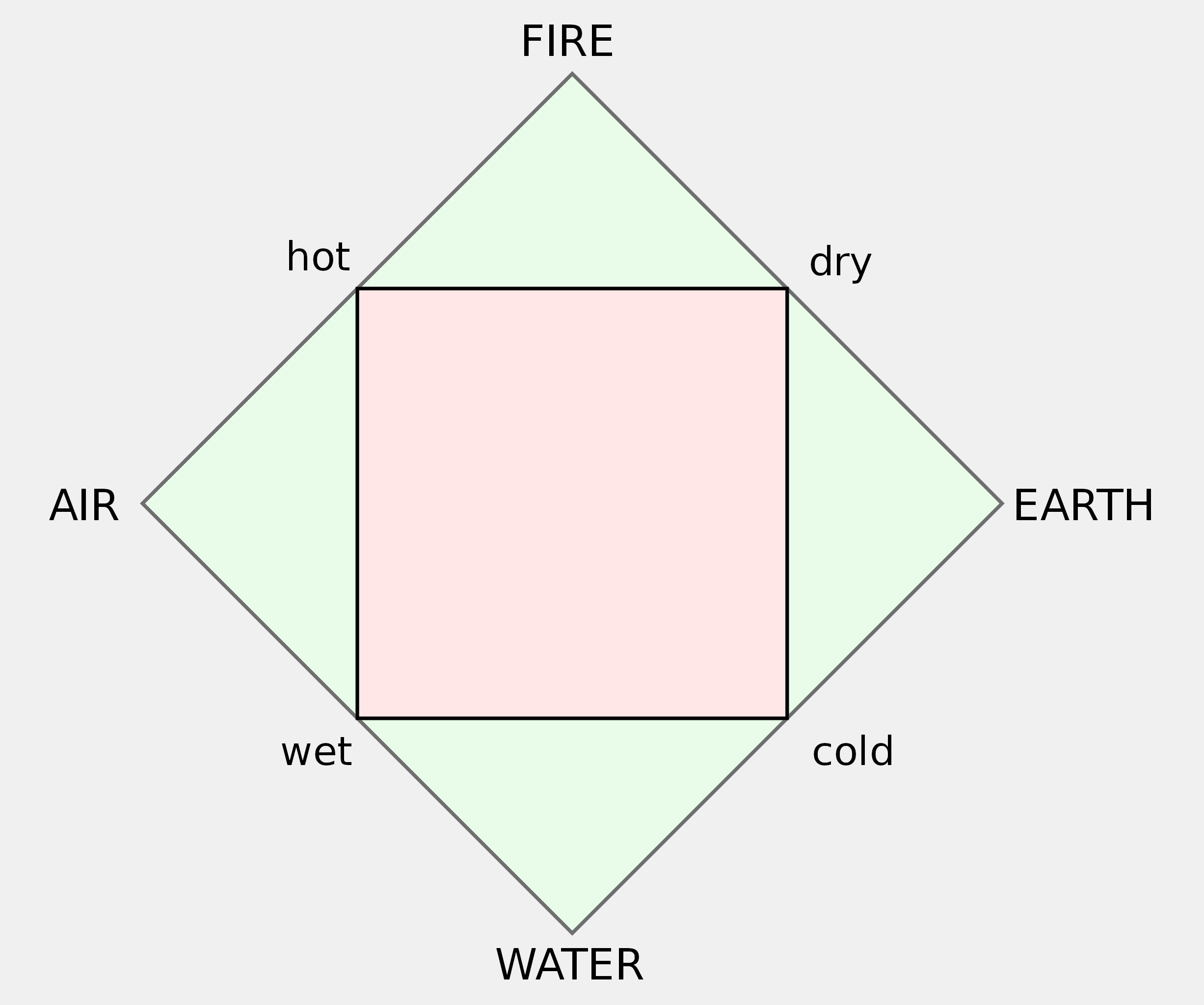
Air people are brilliant, curious, independent, talkative, observant, and entertaining, but sometimes they are also impractical and restless. They are intellectuals, always on a quest for new information. And while Air people have an incredible penchant for developing new ideas and telling stories, they find it difficult to truly connect emotionally with others, even though they want nothing more than to be completely understood. So it is essential for them to learn to put weight on their words and tap into the earth and be grounded. They are fast in thinking and acting, eager for knowledge and information, great communicators and connectors. Sometimes they are too fickle, it means they change their opinion or their feelings suddenly and without a good reason. Sometimes they may be confused about what they want in life. They are also bohemian, free spirited and nonconformists, a person who does not conform to a generally accepted pattern of thought or action.
Fire people are enthusiastic, impulsive, inspirational, humorous, dramatic and fun. They are natural performers. While fire people easily swing from one extreme to the other, it is important to remember that fire people speak and act straight from the heart. They do everything with passion. Fire people often speak before thinking. It's important for them to learn and know how to communicate, so they won't give others a wrong impression of being too pushy. Their challenge is to find balance in themselves, by learning from other elements. They love to express themselves. They're fun. They are also party lovers. Sometimes they can be too blunt, direct and straightforward. They often say what others are thinking.
Water people are emotional, intuitive, deeply creative, empathetic, spiritual and psychic. Water allows people to emotionally connect with others. Water people are so sensitive that they often have a hard time disconnecting from the chaos of life. Consequently, many water people suffer from addiction as they struggle to fence themselves off from life's pain. Sometimes, when everything becomes too intense, they just want to withdraw for some time. They tend to be secretive and private. It is important that they learn to cope with overwhelming emotions. That they have some time for themselves to examine and reflect on their emotions, with help of meditation, yoga or some other methods, and to recharge themselves. Water people feel a lot and what they feel is real. They're very intuitive. Sometimes they struggle to socialize, because of their high sensitivity and deep emotions. They have a rich imagination and they are very creative.
Earth people are grounded, practical, disciplined and focused. They like instructions, rules, results combined with routine. They are also super organized and clean. They are sometimes such perfectionists that they are always ready to take on any job or task themselves, just to ensure it's done right, or with other words, the way they would like it to be done. Even then, they don't think or feel like anything is ever good enough. While they don't have much friends, they are unwaveringly loyal to those they do have. When it comes to relationships, they are very monogamous. They don't like unimportant talks. They are deeply connected to the earth. They are very grounded, solid, practical, organized and extremely loyal. Sometimes they wants to control, not people, but the process. They have a specific way of doing things and don't understand people that do things differently.
5th Element
Aristotle noted in his Book On the Heavens that the four terrestrial classical elements were subject to change and naturally moved linearly. The first element however, located in the celestial regions and heavenly bodies, moved circularly and had none of the qualities the terrestrial classical elements had. It was neither hot nor cold, neither wet nor dry. This was the new 1st one as the 5th element called aether or quintessence.
Quintessence (𝓠), the name comes from quinta essentia (5th element), is by definition the 5th and highest element, the pure and concentrated essence of a substance, that permeates all nature, that fills the universe beyond the terrestrial sphere. It's the essence of a thing in its purest and most concentrated form, the most perfect embodiment of something. It's the constituent matter of the heavenly bodies and other 4 elements (air, fire, earth, and water). In modern physics, quintessence is a hypothetical form of dark energy, more precisely a scalar field, postulated as an explanation of the observation of an accelerating rate of expansion of the universe.
Sanskrit equivalent of 5th element is called Akasha or Akash (Sanskrit आकाश ākāśa) which translates as space or sky. It is derived from a root kāś meaning "to be". It appears as a masculine noun in Vedic Sanskrit with a generic meaning of "open space, vacuity". In Classical Sanskrit, the noun acquires the neuter gender and may express the concept of "sky; atmosphere". In Vedantic philosophy, the word acquires its technical meaning of "an ethereal fluid imagined as pervading the cosmos". It represents emptiness, consciousness, and intuition.
| Classical | Hinduism/Buddhism | Qualities |
|---|---|---|
| Space or Aether | Akash or Dyaus | |
| Air | Vāyu, Vyāna or Vāta | Hot and Wet |
| Fire | Agní or Tejas | Hot and Dry |
| Water | Āpas or Jala | Cold and Wet |
| Earth | Bhūmi or Pṛthvī | Cold and Dry |
Further reading and references:
- Classical element - Wikipedia
- WHAT ARE THE FOUR ELEMENTS? Science Lesson: Earth, Water, Air, and Fire
- Zoroaster and the theory of four elements
- Mahābhūta - great element - Wikipedia
- Pancha Bhoota or Pancha Maha-Bhoota - five great elements - Wikipedia
- Five Great Elements Explained
- Five Elements (Panchtatva) || Neeta Singhal
- Elemental philosophies throughout history | Avatar: the Last Airbender in Academia
- Alchemy 01 The Elements in Spiritual Growth - YouTube
- https://web.lemoyne.edu/~giunta/EA/ARISTOTLEann.html
- Astrology and the classical elements - Wikipedia
- Elemental Qualities in Astrology
- The four Elements and the Signs
- THE FOUR ELEMENTS AND THE CREATION OF MAN
- The Four Elements ~ Spirit Science 18
- Introduction to Empedocles
- The 5 Elements of Existence Explained | Sadhguru
Four Temperaments
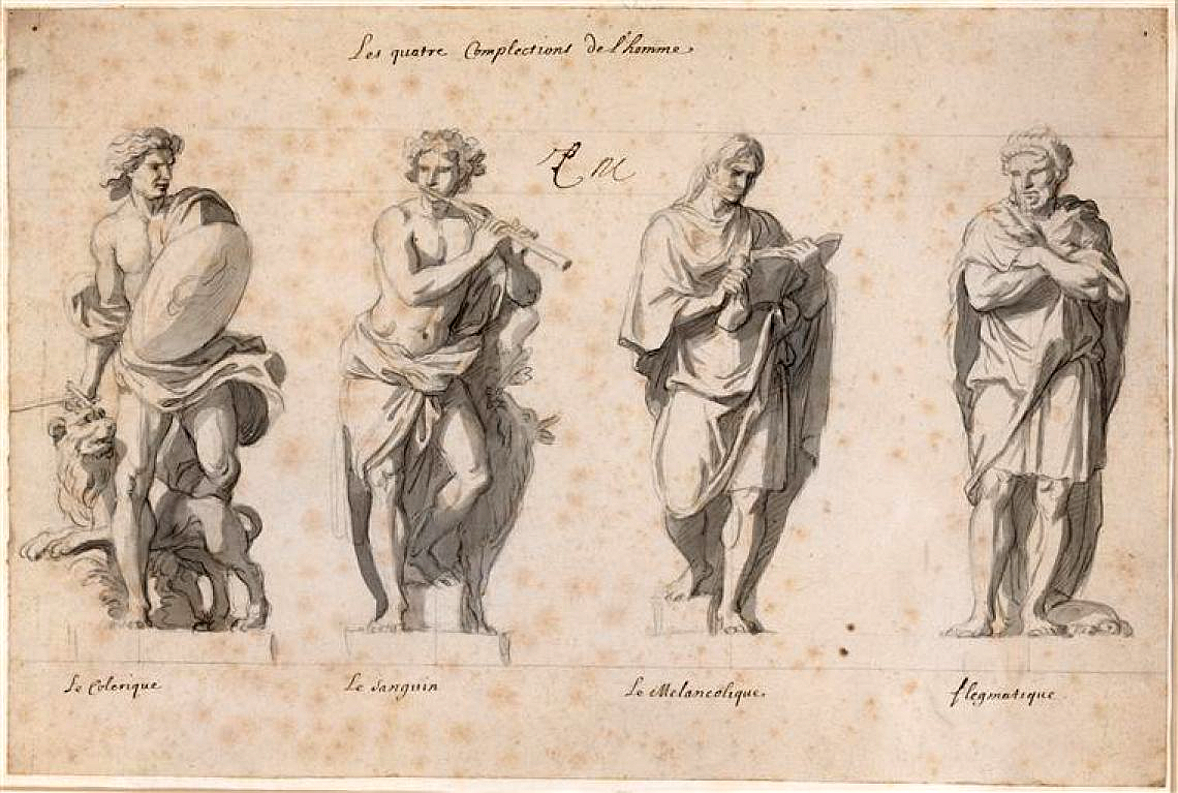
Four temperaments is a theory of psychology about personality. It suggests that there are four bodily fluids that affect human personality traits and behaviour. The temperaments are sanguine, choleric, melancholy and phlegmatic.
Temperament theory has its roots in the ancient theory of humourism. It may have originated in Mesopotamia, but it was Greek physician Hippocrates (460–370 BC) (and later Galen) who developed it into a medical theory. He believed that certain human moods, emotions, and behaviours were caused by an excess or lack of body fluids (called "humours"), which he classified as blood, yellow bile, black bile, and phlegm. Each of which was responsible for different patterns in personalities, as well as how susceptible you were to getting a disease.
The properties of these humours also corresponded to the four seasons. Thus blood, which was considered hot and wet, corresponded to spring. Yellow bile, considered hot and dry, corresponded to summer. Black bile, cold and dry, corresponded to autumn. And finally, phlegm, cold and wet, corresponded to winter.
Waldorf education and anthroposophy believe that the temperaments help to understand personality. They also believe that is useful for education, helping the teachers understand how the child learns.
Further reading and references:
- Four temperaments - Wikipedia
- Four Temperaments: Sanguine, Phlegmatic, Choleric, and Melancholic Personality Types | Psychologia
- Four Temperament - an overview | ScienceDirect Topics
- Four Common Temperament Styles | BetterHelp
- Personality - Theory of Four Temperaments
- The 4 Temperaments - YouTube
- The 4 Temperaments / Humors - YouTube
- 4 Types of Human Temperament - YouTube
- The Four Temperaments - How To Assess People Quickly - YouTube
Elements in Spirituality
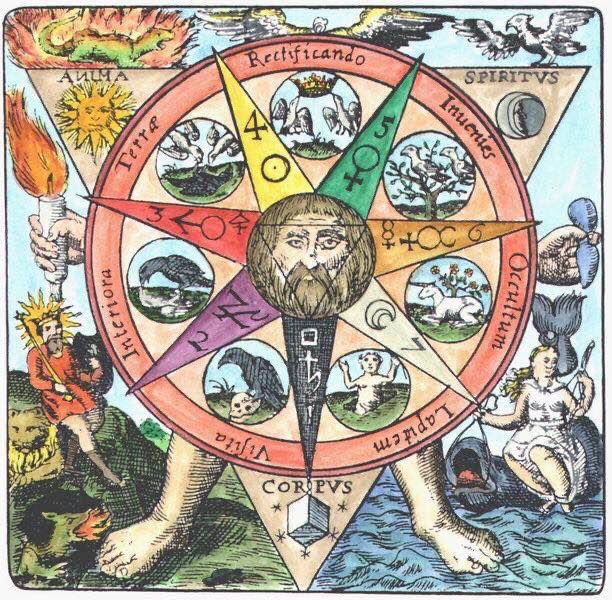
"Nonetheless, it is an apparent, if at times unfortunate, truth of the human condition that we often only become aware of circumstances, conditions, and objects when they change suddenly, when they fail to function in predictable manners, or when they disappear inexplicably from our circadian rhythms. This is especially the case with things elemental. When a flame leaps out unexpectedly from a campfire and licks the surrounding brush or when lightning fissures a halcyon night sky, we become cognizant of the awesome and transfiguring force of fire. When a pipe bursts in the bathroom or when a river breaks its banks and floods communities, we no longer take the calm course of water for granted. When the atmosphere thins as we ascend a mountain or when the pressure in our ears pops on a plane, we sense quickly the presence of what formerly seemed to be missing entirely in the invisible air. When the ground is cleaved and wrenched open or when an avalanche of rock and snow is launched like a toboggan down a precipitous slope, we stand up and take immediate notice of the stirrings of the seemingly solid, stolid, and stable earth."
Elements has a lot of importance in spiritual growth. But to understand what the elements in spiritual growth are, we first need to understand what is or what we mean by spiritual growth. But to understand what spiritual growth means, we need to understand what is "spirit".
In todays dictionaries, there is no accurate or consistent definition for the word spirit. We use it for a lot of things, so these definitions are not very precise. According to dictionaries, spirit can be:
- the non-physical part of a person which is the seat of emotions and character
- a particular way of thinking, feeling, or behaving, especially a way that is typical of a particular group of people, an activity, a time, or a place
- enthusiasm, energy, or courage
- strong distilled alcoholic drink such as brandy, whisky, gin, or rum
- etc.
At Etymonline - Online Etymology Dictionary definition of spirit is more accurate:
spirit (n.)
mid-13c., "animating or vital principle in man and animals," from Anglo-French spirit, Old French espirit "spirit, soul" (12c., Modern French esprit) and directly from Latin spiritus "a breathing (respiration, and of the wind), breath; breath of a god," hence "inspiration; breath of life," hence "life;" also "disposition, character; high spirit, vigor, courage; pride, arrogance," related to spirare "to breathe," perhaps from PIE *(s)peis- "to blow" (source also of Old Church Slavonic pisto "to play on the flute").
According to Barnhart and OED, originally in English mainly from passages in Vulgate, where the Latin word translates Greek pneuma and Hebrew ruah. Distinction between "soul" and "spirit" (as "seat of emotions") became current in Christian terminology (such as Greek psykhe vs. pneuma, Latin anima vs. spiritus) but "is without significance for earlier periods" [Buck]. Latin spiritus, usually in classical Latin "breath," replaces animus in the sense "spirit" in the imperial period and appears in Christian writings as the usual equivalent of Greek pneuma.
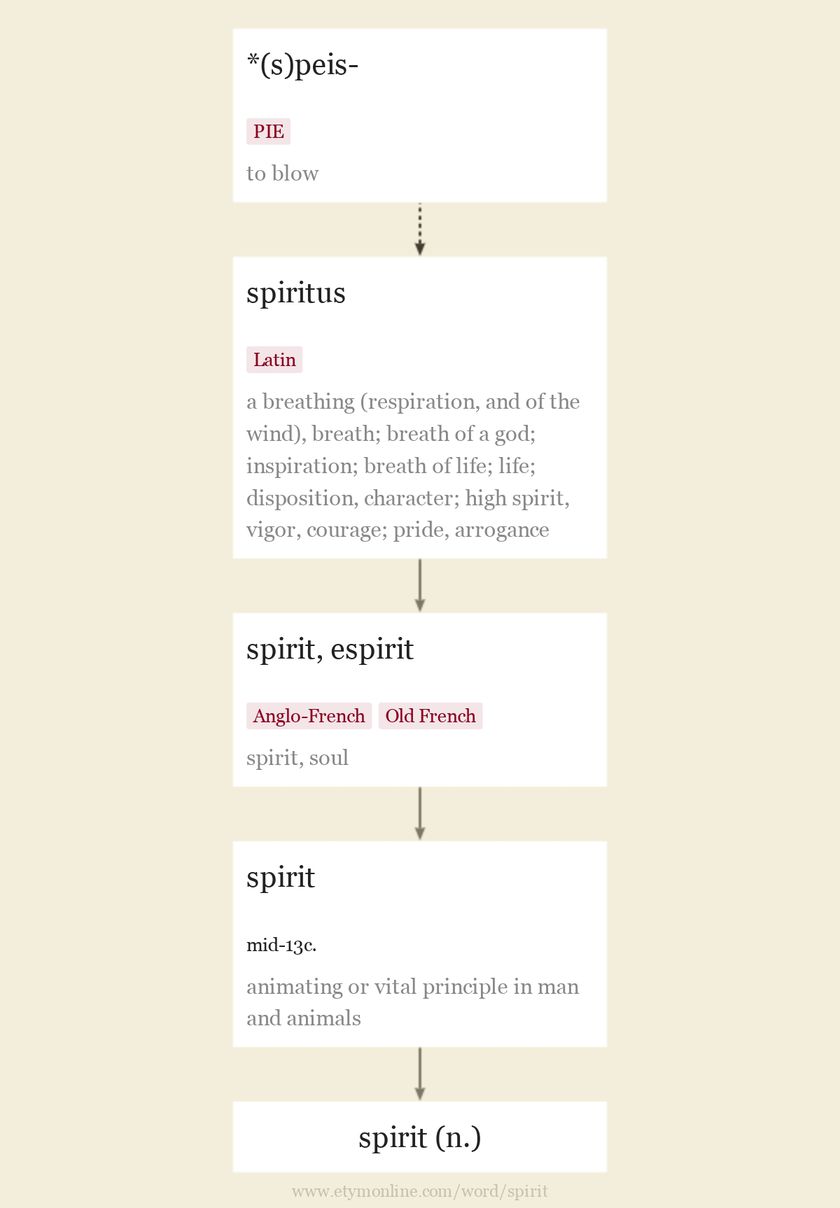
So the true meaning of spirit is in short "animating principle". Also known as soul, conscience, courage, heart, intellect, life, mind, personality, spirit, essence, individuality, reason, substance, truth. In other words, "animating principle" is what brings you to life!
The equivalent symbol in Hinduism is Atman. Directly translated, Atman means "self", but refers to our inner spirit, the essence of ourselves, the ultimate sense of where we come from. In Buddhism, it is simply the Buddha, "the awakened one".
So, when we talk about spiritual growth, we are talking about the awakening of the Self. (1. Corinthians 15)
The Upanishads beautifully describe the hierarchy of the elements in creation:
"From Atman (your inner self) did space come into being;
from space, air; from air, fire;
from fire, the waters; from the waters, the earth;
from the earth, plants; from plants, food;
and from food, man…"
The "space", mentioned here, is not physical space. It is the level of beingness that is empty, ultimate, the repository of all potential. In Sanskrit terms, it's called sunyata (Sanskrit: शून्यता, romanized: śūnyatā; Pali: suññatā), which is usually translated as "devoidness", "emptiness", "hollow", "hollowness", "voidness".
Another thing, we have to be aware of is that these four elements do not refer to physical elements. These are subtle energies, psychological, spiritual forces in nature, in everything, in every level of creation. They represent qualities of matter and energy. They symbolize psychological and spiritual qualities that we need to develop and understand. For example, space represents expansiveness, it represents the attributes of the Absolute. Air represents mobility, flexibility, movement. Fire represents temperature, or in psychological terms, it represents our temperament. Water represents fluidity, flexibility. Earth represents solidity, firmness, strong foundation, strength, willpower.
YHVH
"You shall not take the name of the Lord, your God (יהוה), in vain, for the Lord (יהוה) will not hold blameless anyone who takes His name in vain."
The name of God that appears most often in the Scriptures is Hebrew יהוה YHVH (No Vowels) often referred to as the Tetragrammaton (from Ancient Greek τετραγράμματον tetragrámmaton '[consisting of] four letters') or the Sacred Name. This is commonly accepted as God's "personal" name, though some Scriptural data indicates that this may not be a particular accurate label. The four letters, written and read from right to left (in Hebrew), are Yodh, He, Waw and He. The oldest known inscription of the Tetragrammaton dates to 840 BCE: the Mesha Stele mentions the Israelite god Yahweh.
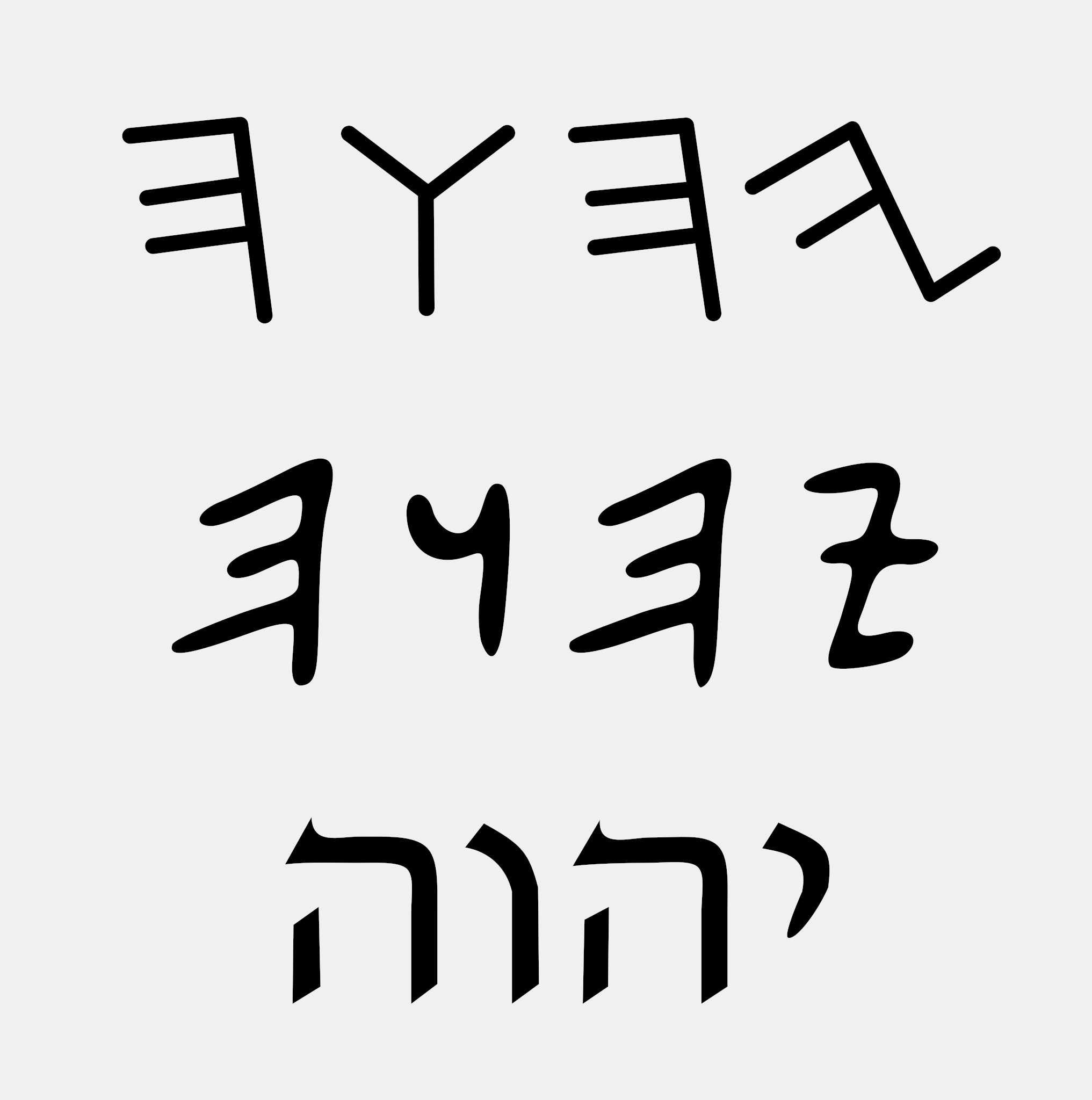
What exactly is this name of God?
"The Kabalah has its ideal geometry, its philosophical algebra and its analogical trigonometry. It thus forces nature (in some way) to reveal her secrets to it. Once this high knowledge is acquired, one passes on to the final revelations of the transcendental Kabalah and one studies in the sacred name (or Shema: יהוה ) which is the source and the reason of all dogmas.
The hieroglyphic figure of the divine Tetragram is the cross + and its four letters are represented by the four suits in the Minor Arcana of the Tarot."
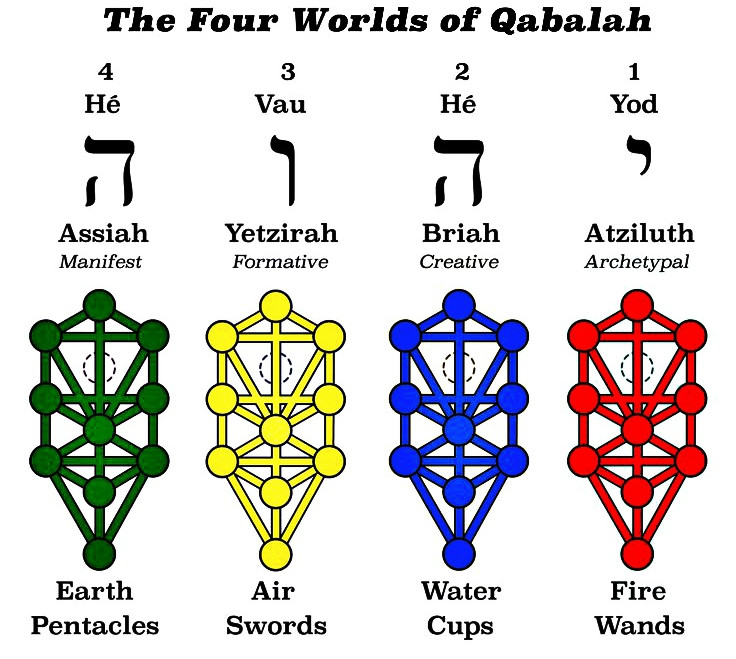
Yahweh, the name of God, representing the biblical pronunciation of "YHWH", the Hebrew name revealed to Moses in the book of Exodus. The name "YHWH" is known as the tetragrammaton, consisting of the sequence of consonants Yod, Heh, Waw and Heh.
It is a representation of force, energy, light, the source from which everything that exists emanates. It is the Breath of Life. It is the complete and final physical manifestation of the creative forces in matter. It is mathematical equation for the essence of the Universe. Tetragrammaton literally stands for Air (Beri'ah), Fire (Atziluth), Water (Yetzirah), Earth (Assiah). All possible combinations of these elements exist within God. Each element is an actual workable substance born out of the original "God substance" (Quintessence, Akasha). The Elements exist on all levels, spiritual, astral and physical. In each level the principle stays the same but, the effect is different only in so far as the limitations of the substance they are sustaining and working with.
To understand how it works, you must know what is Kabbalah Tree of Life and the Sefirot (Hebrew: סְפִירוֹת səp̄īrōṯ), meaning emanations.
Further reading and references:
- Tetragrammaton - Wikipedia
- Tree of life (Kabbalah) - Wikipedia
- Sefirot - Wikipedia
- The Holy & Mysterious Tetragrammaton – Gnostic Studies
- Alchemy and the Tetragram by Samael Aun Weor
- The Son of God
- Sacred Name-YHVH
- The 4 Lettered Name and the Elements - The Hermetic Herald
- The Power of the Tetragrammaton
- The four elements in Jewish literature | Daat Emet
- The Four Elements - Torah & Science
- The Sefirot - Kabbalah, Chassidism and Jewish Mysticism
- Earth, Wind, Fire & Water: The Four Elements of our Inner World - aish.com
- Four Aspects of the Emanated - There is an Emanator and an emanated - Holy Ari
- The Four Elements and the Cross in Armenian Spirituality, with an Excursus on the Descent in Merkavah Mysticism on JSTOR
- The Building-Blocks of Life | II. Before there Was Time. 10. When Letters and Words Add Up | A Guide to the Hidden Wisdom of Kabbalah | Books | Michael Laitman | Kabbalah Library - Bnei Baruch Kabbalah Education & Research Institute
- Four Worlds - Wikipedia
Avatar: The Last Airbender (TV Series)
It is worth mentioning 9th episode of 2nd season, called Bitter Work, especially Mako and Uncle Iroh discussion about elements. Uncle Iroh really explains the essentials about the 4 elements and all-encompassing 5th element.
Uncle Iroh: [Draws Fire symbol in the dirt] Fire is the element of power. The people of the Fire Nation have desire and will and the energy and drive to achieve what they want.
Uncle Iroh: [Draws Earth symbol] Earth is the element of substance. The people of the Earth Kingdom are diverse and strong. They are persistent and enduring.
Uncle Iroh: [Draws Air symbol] Air is the element of freedom. The Air Nomads detached themselves from worldly concerns and found peace and freedom. Also, they apparently had pretty good senses of humor.
Uncle Iroh: [Draws Water symbol] Water is the element of change. The people of the Water Tribes are capable of adapting to many things. They have a sense of community and love that holds them together through anything.
Prince Zuko: Why are you telling me these things?
Uncle Iroh: [Draws straight lines separating the four symbols] It is important to draw wisdom from many different places. If you take it from only one place, it become rigid and stale.
Uncle Iroh: [Draws a circle around all four symbols] Understanding others, the other elements, and the other nations, will help you become whole.
Prince Zuko All this four elements talk is sounding like Avatar stuff.
Uncle Iroh: It is the combination of the four elements in one person that makes the Avatar so powerful. But it can make you more powerful, too.